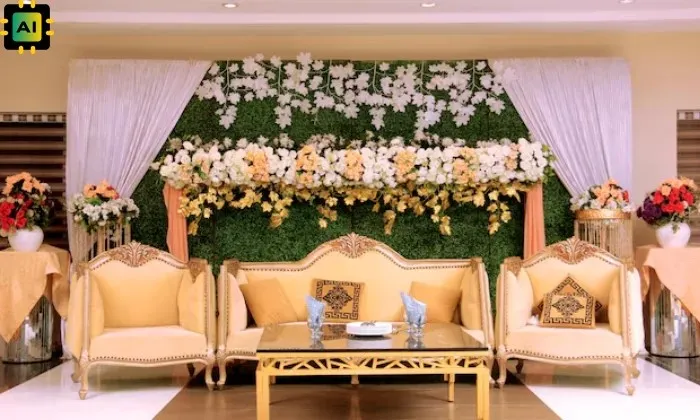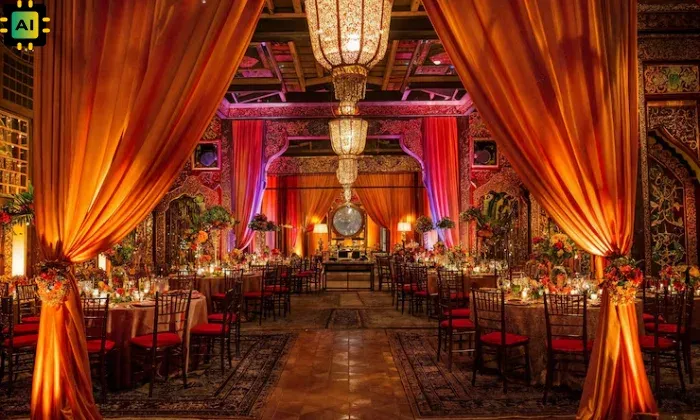Exploring Haldi & Mehendi Alternatives in Muslim Wedding Traditions
 Wedding Trends
Wedding TrendsExploring Haldi &
Mehendi Alternatives in Muslim Wedding Traditions
Wedding is not only two
people; They are a mix of traditions, rituals and cultural manifestations. In
South Asian cultures, rituals such as turmeric (turmeric function) and Mende
(henna function) are of great importance. In Muslim traditions, however, these
ceremonies are either adapted, replaced or practiced with modifications to
match Islamic principles. In this article, we will find out the importance of
these rituals, the causes of alternatives, historical perspectives and
innovative ideas that families can use for their trust and heritage.
Understand Turmeric and
Mehndi in South Asian wedding ceremony
The unrest is a ritual
before marriage in which turmeric paste is used
to bless them with glow, desirable fitness and evil on the groom's pores and
skin. Similarly, the Mehndi function involves the participation of the bride's
palms and feet with complex henna design, which symbolizes splendor, love and
happiness.
While those customs are
inherent in Hindu traditions, they have come to be cultural physical games in
many South Asian groups which include Muslims. However, no longer all Muslim
households include them in the same manner due to differences in spiritual ideals
and interpretations.
Islamic perspective: Why
the option is considered necessary
In Islam, marriage
(Nikah) is a sacred contract rather than a religious ritual. Islam avoids
simplicity, humility and rituals that may be associated with non-Islamic
religious core. For this reason, some Muslims avoid or
modify turmeric and mehndi ceremonies.
Due to the option for the
option is generated:
Religious compliance: To
ensure that rituals do not struggle with Islamic doctrine.
Cultural identification:
To protect uniqueness by respecting broad cultural traditions.
Simplicity: Prevention of
unnecessary waste and focus on the essence of marriage.
Avoid superstition: Islam
advised the ritual and believed that he brings luck or removes evil in
superstitious ways.
Historical background of
wedding rituals in Muslim traditions
Historically, simple, but
simple but simple meaningful ceremonies such as Muslim weddings, Nikah (the
marriage contract), Walima (the wedding party organized by the groom), and the
meetings focused on Quranic texts and blessings. Over time, cultural exchange
in areas such as India, Pakistan and Bangladesh adopted events such as turmeric
and Mehndi. However, researchers have often emphasized the difference between
culture and religious obligations.
Options for Turmeric
Henna night without
religious meanings: Instead of turmeric, the family can organize a henna night,
where Prakash henna is used as a cultural expression, attributed to
superstition.
Dua and Ashirwad Sabha: A
beautiful alternative is to organize a small collection, where family and
friend recite DUA (prayer) for the couple's good, health and future life.
Scent function: Turmeric
instead of turmeric with natural aroma such as rose water or sandalwood is
applied to freshness.
Gift exchange rituals:
Instead of using turmeric, family members can provide symbolic gifts such as
ATAR (perfume), bean beads or scarves.
Options for the Mehndi
ceremony
Henna as a cultural art:
The bride can still use hena as an artistic form, without adding it with
religious meaning.
Quranic calligraphy
design: Some brides choose for henna design inspired by Arabic calligraphy or
floral motifs, and combines traditions with Islamic art.
Spiritual collection of
drugs: Instead of dancing and singing bollywood songs, Family Nasheed (Islamic
Songs) can arrange sessions.
Beauty and wellness love
sessions: Bride can enjoy spa or skin care treatment with close family members
as a complete substitute for Mehndi nights.
Benefits and resistance
to the following options
Pros:
They lined rituals with
Islamic values.
Promotes simplicity and
spiritual conditions.
Non-Islamic faith allows
cultural adaptation without imitation of practice.
Encourages creativity to
celebrate events before the wedding.
Cons:
Traditional turmeric and
Mehndi -colored vibrations can occur.
Generation can cause
disagreement, as older people may prefer traditional functions.
Limited recognition in
mainstream wedding culture.
The importance of
maintaining identity in Muslim weddings
Muslim marriages are
already rich in their beautiful traditions such as Nikah, Walima and Manchi
(dedication). Including options ensures that couples are celebrating in a
meaningful way without reducing religious authenticity. By creating a balance,
the family can respect both trust and cultural heritage.
Innovative and unique
ideas for Muslim rituals before the wedding
Charity Drive: Instead of
turmeric or mehndi, you are hosting a small charity initiative where the family
contributes to a reason for the honor of the couple.
The Quran Reading Circle:
Family members gather to recite the selected verses and pray for the success of
the couple.
Night of Cultural Story:
Sharing family wedding stories, traditions and blessings for the younger
generation.
Photography with smaller
subjects: A creative photography before the wedding that inherits heritage,
modest dress and cultural elements.
Cooking and sharing food:
Traditional dishes from the family can cook together as a binding ritual.
FAQ
Q1. Is it forbidden to
perform turmeric and Mehndi ceremony in Islam?
Not Haraam, but becomes
discouraged when non-Islamic is bound by religious beliefs.
Q2. Can a Muslim bride
henna apply?
Yes, henna is not
acceptable as a decoration when he is not associated with superstition.
Q3. What is a turmeric
option for Muslims?
Dua Sabha, fragrance
rituals or symbolic gift exchange.
Q4. Does all Muslim
families avoid Mehndi celebrations?
No, many embrace Mehndi
as cultural art, but interpretations are different.
Q5. Can the verses in the
Qur'an be drawn into henna?
No, it is not advisable
to avoid washing Islamic scholars.
Q6. What are some minor
entertainment ideas for events before the wedding?
Nasheed nights,
storytelling and cooking sessions.
Q7. Which option is
required?
It is not necessary, but
alternatives help balance the culture with confidence.
Q8. Can Muslim groom
participate in Henna?
Yes, culturally, some
henna uses the groom's hands, but it is optional.
Q9. What does the oldest
think about the alternative?
The perception is
different; Some appreciate simplicity while others remember traditional colors.
Q 10. How does the
alternatives affect the joy of marriage?
They can make weddings
more meaningful by focusing blessings, family relationships and Islamic values.
Aslo Read
Mandap Decoration Ideas for Every Budget
Choosing the Right
Color Palette for Your Wedding
How to Create a
Custom Wedding Menu That Fits Your Budget
Creative Stage
& Mandap Decoration Ideas for Weddings
Instagram:- www.instagram.com/dreamweddinghub
Blog Category
Popular Blogs
-min.webp)
Top Bridal Entry Ideas: Unique and Memorable Ways for Indian Brides
5 Jul, 2024

10 Unique Couple Outfit Colors for Sangeet Ceremony
2 Aug, 2025

Marriage Home in Alwar: Dream Wedding Hub
4 Nov, 2025

Harmonies of Love Top Trending Wedding Songs in 2025
9 Oct, 2025
.webp)
Best Wedding Venues in Alwar : Dream Wedding Hub
25 Oct, 2025

Best Wedding Venues In neemrana (alwar)
31 Oct, 2025
.webp)
Best Wedding Venues in Rajgarh : Dream Wedding Hub
31 Oct, 2025

Wedding Venue in Bassi (Jaipur) : Dream Wedding Hub
23 Oct, 2025

Wedding Venue in Malviya Nagar (Jaipur): Dream Wedding Hub
23 Oct, 2025
 (1).webp)
Best Wedding Venues in Alwar
25 Oct, 2025